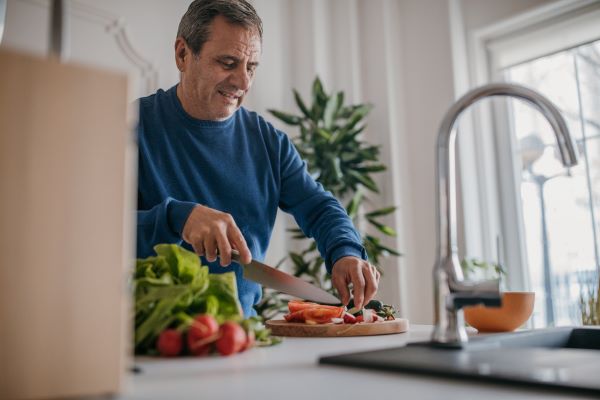
“Blood cancer” is an umbrella term for cancers that affect the bone marrow, blood cells, lymph nodes, and other parts of the lymphatic system. Blood cancers include leukemia, lymphoma, myeloma, myelodysplastic syndromes (MDS), and myeloproliferative neoplasms (MPNs). Each of these diagnoses also contain different subtypes. These subtypes and their treatments can vary greatly. Each person with a blood cancer is unique. Treatments may include watchful waiting (for chronic diseases), chemotherapy or other drug therapy, radiation therapy, stem cell transplantation, or a combination of any of these treatments. Since treatment can differ greatly, the potential side effects of treatment differ as well. Depending on diagnosis, treatment, and overall health, side effects could include digestive issues, high blood sugar, kidney damage, osteoporosis, and/or cholesterol. So, it’s neither quick nor easy to answer the question our registered dietitians are asked every day: “What diet can I eat now that I am diagnosed with blood cancer?”
There is no one-size-fits-all eating plan. Nutrition recommendations tailored to each person are best. However, there are some general strategies that you can use to develop an eating plan while living with blood cancer:
- Be savvy about food safety. All blood cancers affect how blood cells grow and function. Blood cancer and treatment can alter the production of white blood cells, which fight infections as part of the immune system. If your immune system is compromised, you are at an increased risk for infections, including food-borne illness. Practice good food safety in all aspects of food choices, preparation, cooking, and storage. Follow all dietary restrictions recommended by your medical team to reduce the risk of infection. Read about food safety here.
- Focus on adding healthy foods to your week, instead of restricting foods. Cancer can be stressful so don’t add additional pressure by trying to follow dietary restrictions and modifications, especially those from social media or friends which may not be evidence-based nor safe. Your body needs a variety of foods and beverages from all the food groups that carry key nutrients for strength and aid in the repair of cells and tissues damaged by blood cancer and treatments. Learn more tips for healthy eating.
- Explore any of the plant-based eating patterns that are nutritionally balanced. These eating patterns (or diets, if you will) have been studied in clinical trials for specific types of blood cancers by research scientists, most recently for smoldering multiple myeloma¹ and chronic lymphocytic leukemia (CLL).² Get “plant-iful” during blood cancer with one of the plant-based eating plans that may fit your health needs and resources like flexitarian, lacto-ovo vegetarian, Mediterranean, pescetarian, or vegetarian. Learn more about these plant-based eating plans.
- Take small steps when making changes. Plant-based eating doesn’t necessarily mean jumping to a vegetarian diet—it is a journey to include plants as the majority or 2/3 of your meals, with 1/3 or less of your meals as protein from animal sources. Here are some quick ideas:
- Swap out chips or French fries for a garden salad with crunchy croutons.
- Grab fruit for a snack instead of a candy bar.
- Stir chopped veggies into an omelet, muffin recipe or smoothie.
- Go for a whole-grain spaghetti.
- Choose legumes or a bean dish in place of meat.
- Mix quinoa into your brown rice for more whole grains and protein.
- Choose whole-grain crackers with nut butter in place of a plain snack bar.
- Enjoy yogurt with added fruit and granola in place of a sausage biscuit.
- Make “Meatless Mondays” and “Fish on Fridays” a part of your week.
- A healthy, plant-based eating pattern includes a variety of plants such as vegetables, legumes, fruits, grains (especially whole grains), and fats from plants. The plan may also include proteins such as low-fat dairy products, fish, poultry, and occasional lean red meat. If you have digestive issues (gas, diarrhea, or bloating), trouble chewing raw fruits and vegetables, weight loss, or dietary restrictions related to some plants, you may need to take special steps to add more plant-based foods. For example, vegetables can be cooked instead of eaten fresh, try canned fruits instead of raw, cut foods into smaller pieces, and add sauces or gravies for easier chewing. See our blog The Power of Plant-Based Eating.
The final answer to the question is “YES!” There is a diet for people with blood cancer. In fact, there are several eating plans (I like the term “eating plans” better than “diets”) that can fit with your nutritional needs, ability to prepare food, favorite flavors, and need for side effect management. Explore some of the plant-based eating suggestions given above or the American Institute for Cancer Research’s New American Plate to find one that suits you best. Take small steps, one or two changes in a week, so you and your digestion can gradually feel comfortable with plant-based eating.
Through LLS’s Nutrition Education Services Center patients and caregivers of all cancer types can receive a free nutrition consultation with a registered dietitian who has expertise in oncology nutrition.
References
1 “A Study Comparing a Plant-Based Diet with Supplements and Placebo in People with Monoclonal Gammopathy of Undetermined Significance (MGUS) or Smoldering Multiple Myeloma (SMM), The Nutrition Prevention (NUTRIVENTION3) Study.” Memorial Sloan Kettering Cancer Center, 2024-05-09.
2 University of California, San Diego. Feasibility of a whole-feed, plant-based diet for patients with low-risk chronic lymphocytic leukemia (CLL). ClinicalTrials.gov identifier: NCT06377501. Updated May 13, 2024. Accessed August 27, 2024. https://clinicaltrials.gov/study/NCT06377501?cond=Cancer&viewType=Table&term=plant-based&page=2&rank=13.
Resources
Bite By Bite: Supporting Cancer Patients Through Nutrition (Podcast)
Making A Difference Through Nutrition (Podcast)
Food and Nutrition During Cancer Treatment

Looking forward to more posts like this. Keep up the good work!